Henri Bourassa facts for kids
Quick facts for kids
Henri Bourassa
|
|
|---|---|
 |
|
| Member of the Canadian Parliament for Labelle |
|
| In office 1896–1907 |
|
| Preceded by | District created in 1892 |
| Succeeded by | Charles Beautron Major |
| In office 1925–1935 |
|
| Preceded by | Hyacinthe-Adélard Fortier |
| Succeeded by | Maurice Lalonde |
| Member of the Legislative Assembly of Quebec for Montréal division no. 2 | |
| In office 1908–1909 |
|
| Preceded by | Lomer Gouin |
| Succeeded by | Clément Robillard |
| Member of the Legislative Assembly of Quebec for Saint-Hyacinthe | |
| In office 1908–1912 |
|
| Preceded by | Joseph Morin |
| Succeeded by | Télesphore-Damien Bouchard |
| Personal details | |
| Born |
Joseph-Napoléon-Henri Bourassa
September 1, 1868 Montreal, Quebec, Canada |
| Died | August 31, 1952 (aged 83) Outremont, Quebec |
| Resting place | Notre Dame des Neiges Cemetery |
| Political party | Liberal (1896–1899) Independent (1900) Liberal (1900–1908) Independent (1925–1935) |
| Other political affiliations |
Ligue nationaliste |
| Education | Polytechnique Montréal College of the Holy Cross |
| Signature | |
|
Philosophy career |
|
| Era | Philosophy in Canada |
| Region | Western philosophy |
| School | Nationalism, pacifism, social conservatism, ultramontanism |
|
Main interests
|
French Canadian nationalism, Canadian nationalism, Catholic social teaching |
|
Notable ideas
|
"Two founding peoples", language rights in Canada, Canadian autonomy, Canadian neutrality |
|
Influences
|
|
|
Influenced
|
|
Henri Bourassa (born September 1, 1868 – died August 31, 1952) was an important French-Canadian political leader and publisher. He is best known for speaking out against Canada sending soldiers to fight for Britain in the Second Boer War in 1899. He also strongly opposed conscription (forced military service) during World War I. Bourassa believed that Canada should focus on its own interests and have more independence from Britain. He was a key figure in shaping French-Canadian nationalism, which is a strong sense of identity and pride among French-speaking Canadians.
Contents
Early Life and Education
Henri Bourassa was born in Montreal, Quebec. His father was Napoléon Bourassa and his mother was Azélie Papineau. He was the grandson of Louis-Joseph Papineau, a famous politician who fought for democracy.
Bourassa studied at École Polytechnique de Montréal and the College of the Holy Cross in Massachusetts, USA. At just 22 years old, in 1890, he became the mayor of Montebello, a town in Quebec.
Political Journey
Early Federal Career
In 1896, Bourassa was elected to the House of Commons of Canada as an independent Liberal for the area of Labelle. However, he resigned in 1899. This was to protest Canada sending troops to the Second Boer War in South Africa. He was re-elected shortly after his resignation.
He openly criticized Prime Minister Wilfrid Laurier, saying Laurier was too loyal to the British Empire.
Forming the Nationalist League
To fight against what he saw as the problems of imperialism (when a country extends its power over others), Bourassa started the Ligue nationaliste canadienne (Canadian Nationalist League) in 1903. This group aimed to create a strong Canadian identity among French-speaking people. They wanted Canada to be more independent within the British Empire, rather than depending too much on Britain or the United States.
Leaving Federal Politics
Bourassa left the federal parliament in 1907. But he stayed active in Quebec politics. He was elected to the Legislative Assembly of Quebec in 1908 for Montréal division no. 2. He led the Nationalist League until he left the assembly in 1912.
He continued to criticize Laurier, especially Laurier's plans to create a Royal Canadian Navy in 1910. Bourassa worried this navy would pull Canada into future wars between Britain and Germany. He supported having an independent Canadian navy, but not one controlled by Britain. Bourassa's strong opinions weakened Laurier's support in Quebec. This helped the Conservative Party win the 1911 election, even though they were more supportive of the British Empire.
Founding Le Devoir
In 1910, while serving in the provincial assembly, Bourassa founded the newspaper Le Devoir. He wanted this newspaper to promote the Nationalist League's ideas. He was its editor until 1932. Bourassa wanted Le Devoir to be independent from political parties. He chose the name Le Devoir (meaning "The Duty") to show his commitment to honesty and serving the public good.
Protecting French Language Rights
In 1913, Bourassa strongly criticized the government of Ontario. This was during the Ontario Schools Question crisis, when Ontario nearly banned the use of the French language in its schools. He urged French Canadians to see their enemies within Canada itself. He said that if French-speaking people in Ontario were treated unfairly, other French groups in English Canada would soon face the same problems.
World Wars and Conscription

Bourassa led the French-Canadian opposition to Canada's involvement in World War I. He especially opposed Prime Minister Robert Borden's plan for conscription in 1917. Conscription meant that people would be forced to join the military. Bourassa believed the war was important for France and Britain. However, he felt that only Canadians who volunteered should go to fight in Europe. His opposition to conscription made many English-speaking Canadians upset.
After saying he was done with politics, Bourassa returned to the House of Commons in 1925 as an Independent Member of Parliament. He served until he lost his seat in the 1935 election.
Bourassa also opposed the draft during the conscription crisis of 1944 in World War II. He was a member of the Bloc populaire, a political party. His ideas still influence Quebec politics today.
Later Life and Legacy
Henri Bourassa passed away in Outremont, Quebec in 1952, just one day before his 84th birthday. He was buried in Montreal's Cimetière Notre-Dame-des-Neiges.
Several places in Montreal are named after him, including Henri Bourassa Boulevard, the Henri-Bourassa metro station, and the federal voting area of Bourassa. There are also places named after him in Papineauville, Quebec. He is not related to Robert Bourassa, who was a premier of Quebec.
Bourassa's political ideas were a mix of different philosophies. He supported civil liberties for French Canadians and believed in Canadian independence. He also had strong Catholic beliefs about social issues. While he thought the Church was important for faith and morals, he didn't want it to control politics. He believed in moral reform and less government involvement where possible.
Historians have often viewed Bourassa based on their own opinions about the issues he discussed. He was seen as a champion of French-speaking rights and always opposed Quebec separating from Canada. His views on social issues, which emphasized family and traditional values, have also received both praise and criticism.
Works
- Le projet de Loi Navale. Sa nature ses conséquences. (Speech given at the Monument National on January 20, 1910).
- Pour la justice. La législation scolaire au Nord Ouest. Les discours de MM. Monk et Pelletier. Quelques objections. L'esprit de la Confédération.
- L'Emprunt de la Victoire la surenchère du bluff.
- Que Devons-Nous À L'Angleterre? La Défense Nationale. La Révolution Impérialiste. Le Tribut À L'Empire.
- L'intervention américaine ses motifs son objet ses conséquences.
- Le pape arbitre de la paix (1918)
- La Langue Gardienne de la Foi.
- La Propriété, Ses Bornes, Ses Abus. (Conference at the Semaine Sociale De Sherbrooke, August 11, 1924)
- Henri Bourassa; Biographie, Index Des Écrits, Index de la Correspondance Publique 1895–1924.
Images for kids
See also
- Politics of Quebec
- Conscription Crisis of 1917
- Conscription Crisis of 1944
- National Assembly of Quebec
- List of third party leaders (Quebec)
- History of Quebec
Primary sources
- Henri Bourassa fonds at Library and Archives Canada. Archival reference number is R8069.
- Patrick Allen et al., eds. La pensée de Henri Bourassa (1954)
- Levitt, Joseph, ed. Henri Bourassa on Imperialism and Biculturalism, 1900–1918 (1970)
 | William Lucy |
 | Charles Hayes |
 | Cleveland Robinson |

